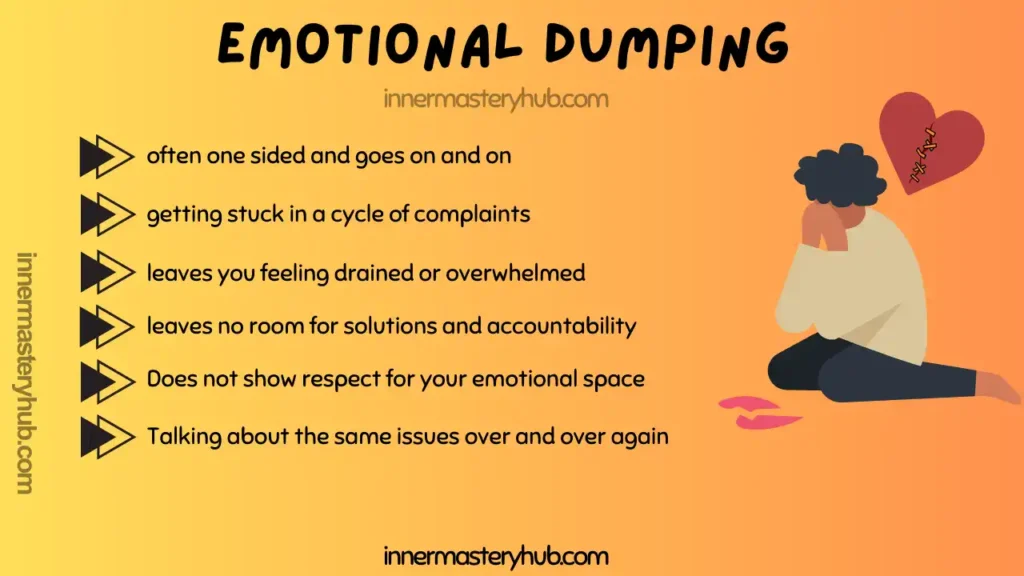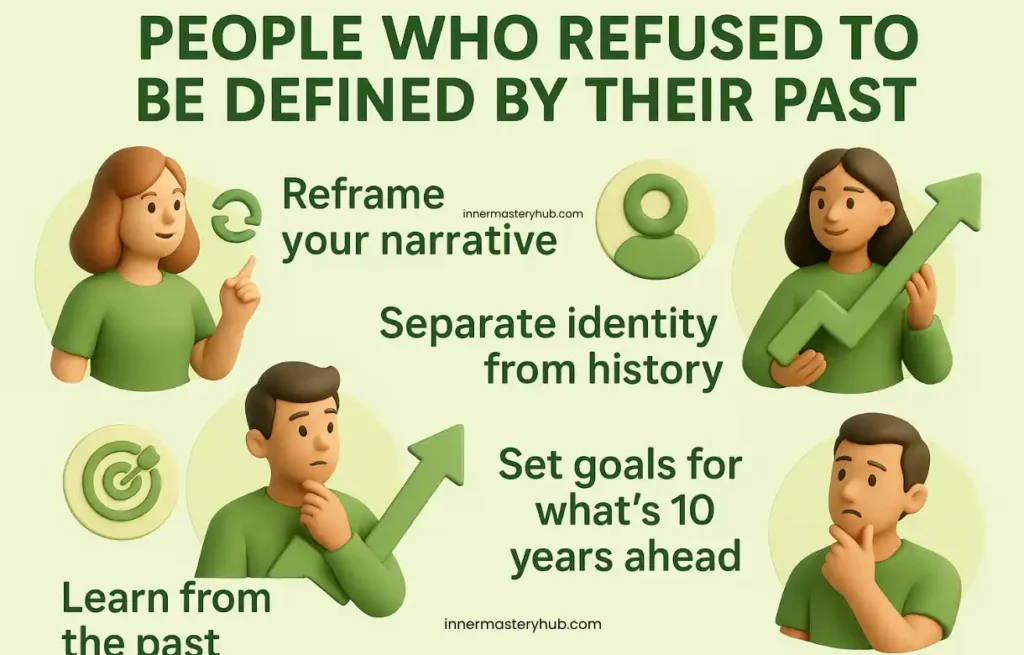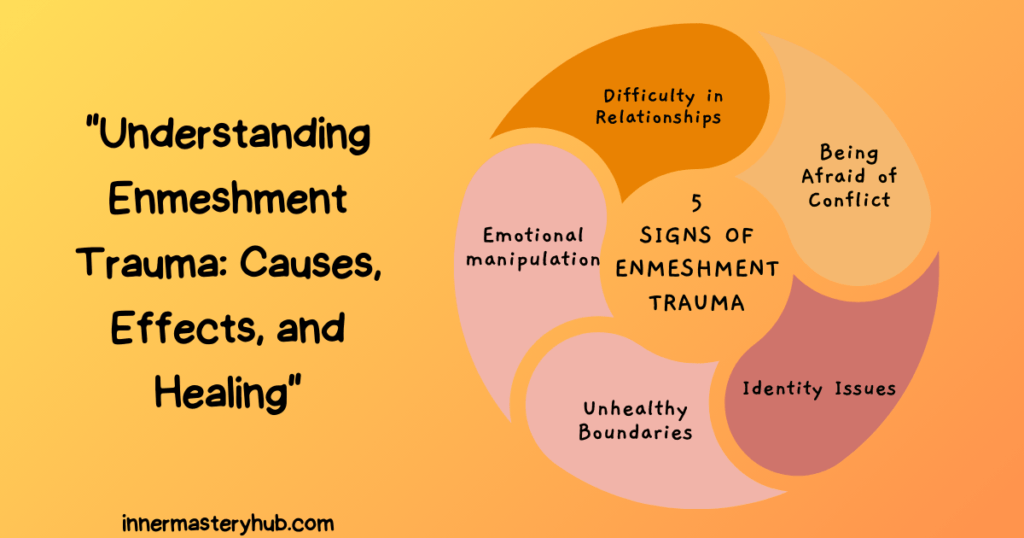Emotional Dumping vs Venting: 7 Ways to Escape the Spiral
What is Emotional Dumping?
When one person releases strong emotions without the other person’s knowledge, it’s known as emotional dumping. This overloads the listener’s emotional regulation system, leading to tension, exhaustion, and blurred boundaries.

Emotional dumping starts during your normal conversations. You want to be supportive, so you listen when someone you care about shares their stress. After that, though, you feel exhausted and oddly accountable for their suffering. You can even ask, “Why do I feel terrible after helping someone?”
The fundamental misconception of emotional dumping is that, although it may appear to be a connection, below it is an uncontrollable emotional transfer. Here comes the need for your own emotional regulation. Emotional regulation is the capacity to recognise, understand, and control emotions without becoming overwhelmed.
When this ability is lacking, discussions turn from constructive sharing to emotional overload. Your neurological system suffers as a result of you becoming the vessel for feelings that you never had.
Psychologists describe emotional regulation as the ability to monitor and modify emotional reactions. According to James Gross, a leading researcher in emotion science, emotions unfold through a process involving situation, attention, interpretation, and response (Gross, 1998, Review of General Psychology[enf_note]https://journals.sagepub.com/doi/10.1037/1089-2680.2.3.271[/enf_note]. When this process becomes dysregulated, emotional dumping follows.
Signs of Emotional Dumping
Addressing the emotions dump begins with recognising it. These are the leading indicators:
One-Sided Conversations
Rarely does the person who is dumping let the other person speak; instead, they control the conversation. They let their emotions out without asking for the listener’s feedback.
No Consideration for Boundaries
An emotion dump occurs without first determining whether the listener is emotionally equipped to handle the conversation. For instance, someone calls at an awkward time or overwhelms someone after a demanding day.
Continuing Complaints
Without acting or looking for answers, the dumper repeatedly raises the same issues. This cycle leaves the listener feeling powerless.
Lack of Emotional Awareness
Dumping emotions overlooks the listener’s emotions. The person who is venting has no idea how their words or level of intensity may emotionally impact the other person.
Lack of Interest in Finding Solutions
The goal of dumping your emotions is to let them go rather than address the issues that caused them. The person ranting might not want to resolve the problems they are discussing.
Overwhelming Emotions
Following interactions with someone who vents their feelings, the listener commonly feels fatigue, anxiety, or tension. This is an obvious indication of an imbalanced relationship dynamic.
Constant Negativity
The main focus of dumping emotions is typically expressing unpleasant feelings, such as anger, dissatisfaction, or hopelessness, without balancing them with neutral or uplifting topics.
You can take steps to control emotional dumping and improve communication by recognising these symptoms.
What Is Happening Inside You During Emotional Dumping?
Over-identification replaces empathy in your brain during emotional dumping. Your interpretation of the other person’s pain as a problem that needs to be resolved sets off stress hormones. Emotional stress, introspection, and finally fatigue are brought on by this.
Usually, the internal sequence goes like this:
A person shows signs of pain. You see it as personal and urgent. Anxiety results from that interpretation. The cause of overthinking is anxiety. Emotional exhaustion results from overanalysis.
Despite the outward appearance of friendliness, your body is experiencing a stress cycle. Research shows that reappraisal, or changing how we interpret emotional situations, significantly improves emotional outcomes (Gross & John, 2003, Journal of Personality and Social Psychology[enf_note]https://psycnet.apa.org/doiLanding?doi=10.1037%2F0022-3514.85.2.348[/enf_note].
Emotional Dumping Examples
Here are some examples to illustrate how it appears in different relationships and situations:
Emotional dumping in relationships
When one spouse lets their feelings out without considering the other’s limits, it’s called an emotional dump in a relationship. For example, a person may constantly complain about personal or professional stress without asking their partner for their opinion.
The listener feels emotionally abandoned, exhausted, and unheard as a result of this one-sided conversation. It leads to an imbalance over time, which makes the partnership feel less like a collaboration and more like a responsibility.
Mutual respect and empathy are necessary for effective communication. Stop dumping and ask your partner if they have the energy to listen instead. Stronger emotional bonds and relationships are built through mindful sharing of feelings and communication with one another.
Emotional dumping on the mother
Sarah, a teenager, calls her mother, Linda, to talk about her tensions, friendship problems, and work pressures. Sarah takes up the conversation and vents her frustration without asking about Linda’s well-being. Despite her personal stress, Linda listens out of love.
However, Linda begins to feel burned out after making several calls like this. She feels neglected and overburdened rather than supported. Their connection suffers as a result of Linda’s realisation that she needs balance and support from all parties, not merely to be her daughter’s emotional outlet.
Emotional dumping on a friend
My buddy Emma used to call me all the time to talk about her day, including relationship conflicts, work issues, and everything else. At first, listening didn’t bother me, but eventually, it got to be too much.
She never checked in with me or asked how I was doing. She began to use me as a channel for her emotions, which, to be honest, exhausted me. There was no longer a healthy level.
Emotional dumping at work
I frequently listen to my coworker Mark at work as he constantly complains about his boss and the demands of his job. He will continue to vent his frustration, hoping that I will take it all in. Even though I want to be helpful, it wears me out.
I get exhausted after a while and find it difficult to concentrate on my own work. It would be great if he would balance his outbursts with some constructive criticism.
Why Does Emotional Dumping Feel So Draining?
Because your brain interprets the other person’s suffering as though it were your own, emotional dumping feels exhausting. When you lack emotional boundaries, your stress response keeps going off, raising cortisol levels and leaving you feeling emotionally spent even though you never caused the issue.
In Daring Greatly, Brené Brown explains that in order for vulnerability to be beneficial, boundaries must be established. When there are no boundaries, what appears to be intimacy turns into emotional overload. You feel disconnected and accountable.
You can listen empathetically while maintaining your composure when you have good emotional control. However, you absorb rather than observe when there is little regulation or when you are already under stress.
Emotional Dumping vs Emotional Sharing
There is a difference between emotional sharing and dumping emotions. Sharing your emotions with others can be balanced by asking for support while keeping the other person’s feelings in mind.
In contrast, an emotional dump occurs when you release your feelings without considering the listener’s emotional state, expecting them to take it all in without sharing anything in return. Relationships can be drained by dumping emotions, but sharing emotions is healthy.
Emotional Dumping vs Venting
Although they may appear to be similar, dumping and venting are not the same thing. When you vent, you express your emotions to someone while being sensitive to their feelings and seeking support.
However, emotional dumping ignores the other person’s emotional state and is one-sided. It’s dumping if you’re unloading without considering the listener’s needs. When venting is done well, it’s balanced and promotes understanding.
How to Deal with An Emotionally dumping friend?
Dealing with an emotionally dumping friend can be hard, but remember to set boundaries. Let them know gently when you’re not in the right headspace to listen, saying something like, “I care about you, but I need a break.”
Ask them to seek help elsewhere, such as a therapist, if needed. Make sure you’re also taking care of your own emotional well-being while offering support.

How to Tell Someone to Stop Emotionally Dumping on You?
If someone is dumping emotions on you, do not forget to set boundaries calmly. You can say something like, “I care about you, but I’m feeling overwhelmed right now and can’t handle more emotional stress. Can we talk about this later, or maybe find another way to work through it?”
Be clear, gentle, but firm, making sure they know you need space without dismissing their feelings.
How do I Stop Emotional Dumping?
If you’re noticing that your relationships are being negatively impacted by dumping emotions (ED), it’s time to make a shift. Before you express your feelings, become mindful of them. Consider whether the person you are speaking with has the emotional stamina to listen.
Learn self-regulation skills to handle emotions on your own, such as writing or deep breathing. Asking how the other person is doing rather than reflecting on your own difficulties helps strike a balance in your interactions. Relationships can be made healthier and more supportive by respecting loved ones’ feelings and setting boundaries.
Emotional Dumping vs Trauma Dumping
Although “trauma dumping” and “emotional dumping” (ED) sound similar, they are not the same. Dumping emotions is the act of venting about everyday frustrations, such as relationship problems or work-related stress, without considering others’ feelings.
Even if it’s biased, it may not always result in severe emotional trauma. However, trauma dumping happens if someone shows difficult, unresolved traumatic memories, usually without asking if you’re ready to listen.
Because of the seriousness of the experiences exposed, trauma dumping is more powerful and triggers intense emotional reactions, though both can be overwhelming[enf_note]https://www.ncbi.nlm.nih.gov/books/NBK207191/[/enf_note].
Is Emotional Dumping Abuse?
When it becomes persistent and one-sided, emotional dumping can feel like emotional abuse. Being the listener all the time without receiving any help in return might be exhausting. You may feel overburdened. It’s necessary to set boundaries and ensure you and the other person are having balanced, healthy conversations.
How to Dump Negative Emotions?
Let go of unpleasant feelings if you’re feeling overwhelmed. First, acknowledge that sadness, anger, and frustration are normal human emotions. However, letting your emotions run wild can make you feel worse or burden others; learn to control them and know how to let them out.
Start by finding a safe space where you can express yourself. This could be writing in a journal, going for a walk, or even talking to a trusted friend who’s open to listening. Vent, but set a time limit.
Permit yourself to experience your feelings, but resist the need to let them control you. Try to concentrate on what you can manage and what’s within your control.
Breathe deeply and use relaxation techniques to calm down after venting. It helps to take a moment to reflect on the bigger picture. Sometimes, gaining perspective can help you let go of those negative emotions more quickly.
Lastly, keep in mind that you should also ask for answers when you’re ready. Venting should be used to relieve pressure, not to add to it.
To put it briefly, finding balance, letting go of the negative without allowing it to take over, is the key to a good emotional dump.
Emotional Dumping Journal Prompt
Take a moment to reflect on your recent emotional experiences. Think about a time when you felt the need to vent or “dump” your emotions onto someone.
- What triggered those emotions?
- How did you express them?
- How did the other person react?
- How did you feel afterwards?
Now, consider: How could you have expressed yourself differently? What could you do next time to ensure a more balanced conversation, where both your feelings and the other person’s boundaries are respected?
How Do You Know If You’re Experiencing Emotional Dumping?
If talks leave you feeling stressed, exhausted, obligated to solve other people’s issues, or emotionally burdened long after they are over, you may be suffering emotional dumping.
Typical symptoms include feeling pressured to react right away, repeating conversations, avoiding certain people because you’re tired, or feeling bad about taking a break.
Your emotional regulation system is signalling the need to modify your internal interpretations and boundaries.
Takeaway
Talking excessively about one’s difficulties is not the only aspect of emotional dumping. It concerns the cooperation or failure of emotional control, interpretation, and limits. When you understand the internal process, you start to see what is actually going on within, and you stop blaming yourself for feeling exhausted.
The change isn’t about losing concern. It’s about realising. Relationships change on their own when you understand that empathy does not necessitate emotional absorption. You pay attention without carrying. You’re concerned without giving up. Additionally, the connection becomes sustainable rather than draining as your emotional control improves.
If you recognise yourself in this pattern, pause and reflect on your emotional regulation rather than judging your empathy. Awareness changes how you listen, respond, and protect your emotional energy.
FAQs about Emotional Dumping
What is emotional dumping?
Emotional dumping is when someone unloads their feelings or problems onto another person without considering the listener’s emotional state, time or consent. It’s often one-sided and draining for the listener.
What are the signs someone is emotionally dumping on me?
Signs include: You feel exhausted after talking; the other person monopolises the conversation; you don’t get to share; topics repeat; and you dread contact.
How is emotional dumping different from venting?
Venting is a mutual exchange where you check whether someone is okay to listen and share responsibly. Emotional dumping lacks consent and mutuality and often leaves the listener drained rather than supported.
Why do people emotionally dump?
Often, because they feel overwhelmed, lack awareness of boundaries, haven’t processed emotions, or learned to connect through oversharing. The need to be seen or heard can drive it.
What can I do if I realise I’ve been emotionally dumping?
Start by checking in with the listener: “Are you in a space to talk?” Honour their boundaries, consider journaling or therapy, and work on self-regulation.
How can I respond when someone is dumping on me?
You can state your boundaries kindly: “I care about you, but I’m not able to hold all of this right now.” Suggest other supports and take care of yourself.
What is an example of emotional dumping in a relationship?
An example of emotional dumping in a relationship is when one partner repeatedly unloads anger, stress, or frustration about work onto the other without asking if they have space to listen, leaving them feeling overwhelmed, responsible, and emotionally drained afterwards.
How to tell someone to stop emotional dumping on you?
You can say calmly, “I care about you, but I’m feeling overwhelmed right now. I’m not in the right space to take this on. Can we pause or talk about this later?” This sets a clear boundary while staying respectful and supportive.






